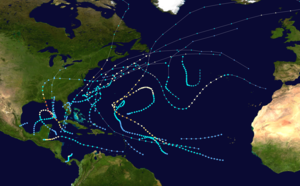Hurricane Debbie (1969) is in the process of being merged into this article. If possible, please edit only this article, as the article mentioned above may be turned into a redirect. Relevant discussion may be found here. (July 2024) |
| 1969 Atlantic hurricane season | |
|---|---|
 Season summary map | |
| Seasonal boundaries | |
| First system formed | June 8, 1969 |
| Last system dissipated | November 25, 1969 |
| Strongest storm | |
| Name | Camille |
| • Maximum winds | 175 mph (280 km/h) (1-minute sustained) |
| • Lowest pressure | 900 mbar (hPa; 26.58 inHg) |
| Seasonal statistics | |
| Total depressions | 23 |
| Total storms | 18 |
| Hurricanes | 12 |
| Major hurricanes (Cat. 3+) | 3 |
| Total fatalities | 535 total |
| Total damage | $1.495 billion (1969 USD) |
| Related articles | |
The 1969 Atlantic hurricane season was the most active Atlantic hurricane season since the 1933 season, and was the final year of the most recent positive Atlantic multidecadal oscillation (AMO) era. The hurricane season officially began on June 1, and lasted until November 30. Altogether, 12 tropical cyclones reached hurricane strength, the highest number on record at the time; a mark not surpassed until 2005. The season was above-average despite an El Niño, which typically suppresses activity in the Atlantic Ocean, while increasing tropical cyclone activity in the Pacific Ocean. Activity began with a tropical depression that caused extensive flooding in Cuba and Jamaica in early June. On July 25, Tropical Storm Anna developed, the first named storm of the season. Later in the season, Tropical Depression Twenty-Nine caused severe local flooding in the Florida Panhandle and southwestern Georgia in September.
The most significant storm of the season was Hurricane Camille, which peaked as a Category 5 hurricane on August 17 and devastated the Gulf Coast of the United States upon striking Mississippi the next day. Strong winds and storm surge heights especially impacted Mississippi and Louisiana. Later in its duration, the storm caused severe flooding Virginia and West Virginia. Camille alone was responsible for 259 deaths and $1.43 billion.[nb 1] It was the costliest United States hurricane at the time, until Hurricane Agnes in 1972. In early September, Hurricane Francelia caused deadly floods in Central America, with 271 people killed in Central America. Hurricane Inga had the third longest duration of an Atlantic tropical cyclone. The last storm, Hurricane Martha, was the only known tropical cyclone to make landfall in Panama. Martha caused minor flooding in the former and Costa Rica. Overall, the systems of the season collectively caused 535 deaths and over $1.5 billion in losses.
Cite error: There are <ref group=nb> tags on this page, but the references will not show without a {{reflist|group=nb}} template (see the help page).